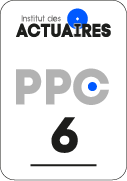Calendrier des événements

ESSEC working Group on risk
AI and Health - The Health Data Hub
L'Institut des actuaires s'associe au Working Group on Risk de l'ESSEC-CREAR pour sa prochaine conférence sur le thème : "21st century causal inference that capitalizes on classical design of experiments and modern computing, illustrated with an epigenomic human experiment "
par Prof. Marie-Abèle BIND, MGH Biostatistics Center & Harvard Medical School, USA.
Vous trouverez plus d'informations ici
Pour assister à la conférence cliquez ici (mot de passe WGRisk)
Participer à cette conférence vous permettra d'ajouter 6 points à votre score de Perfectionnement Professionnel Continu (PPC CERA).

Abstract : In randomized experiments, Fisher-exact p-values are available and should be used to help evaluate results rather
than the more commonly reported asymptotic p-values. One reason is that using the latter can effectively alter the question being addressed by including irrelevant distributional assumptions. The Fisherian statistical framework, proposed in 1925, calculates a p-value in a randomized experiment by using the actual randomization procedure that led to the observed data. Here, we illustrate this Fisherian framework in a crossover randomized experiment. We focus on 10 epigenetic outcomes that illustrate important differences between the asymptotic and Fisher tests for the null hypothesis of no ozone effect. For some outcomes, the traditional p-value based on the approximating asymptotic Student’s t distribution substantially subceeded the minimum attainable Fisher-exact p-value. For the other outcomes, the Fisher-exact null randomization distribution substantially differed from the bell-shaped one assumed by the asymptotic t test. Our conclusions: When researchers choose to report p-values in randomized experiments,
1) Fisher-exact p-values should be used, especially in studies with small sample sizes, and
2) the shape of the actual null randomization distribution should be examined for the recondite scientific insights it may
reveal.
Voir tous les événements
Vendredi 26 février 2021
14h00
- 15h00
(GMT +2)
L'événement est organisé en ligne
Aucun commentaire
Vous devez être connecté pour laisser un commentaire. Connectez-vous.





